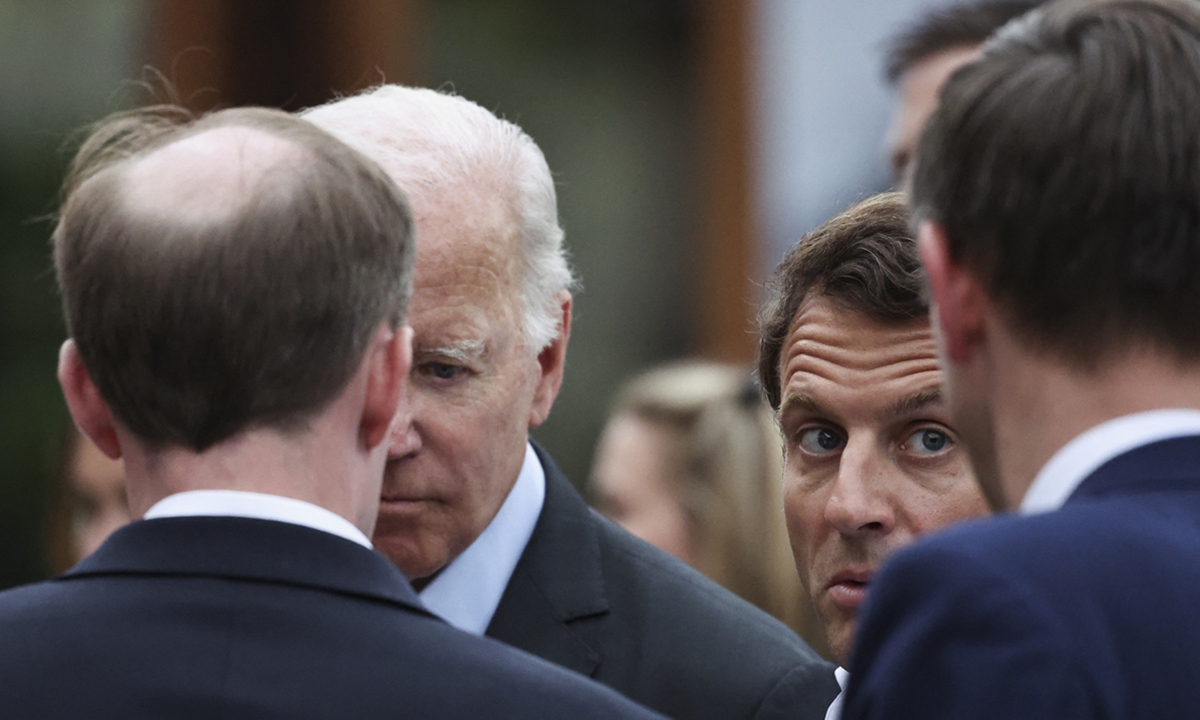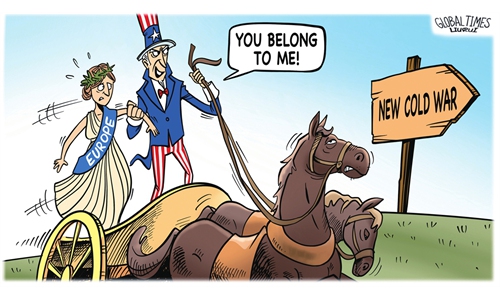Macron's dissatisfaction toward US will bring some variables to transatlantic ties

US President Joe Biden (left) and French President Emmanuel Macron attend the G7 Summit on June 27, 2022 at Elmau Castle, southern Germany.Photo: AFP
Recently, French President Emmanuel Macron expressed his dissatisfaction with the US on multiple occasions.
Earlier this month, Macron criticized the US for selling energy and gas to Europe at four times the price the US sells to its own industry. "That is not exactly the meaning of friendship," Macron said. He then reminded US President Joe Biden to "speak with prudence" when commenting on the risk of nuclear conflict. During a press conference following the just-concluded EU summit in Brussels, Macron, again, called out US "double standards" over selling gas to Europe at prices three to four times higher than it is sold in the US domestic markets. TFIGlobal, an India-based media outlet, published an article on October 18 entitled, "Forget US-Russia, a cold Cold-War is underway between France and the US."
While the West is trying hard to portray its unity amid the Russia-Ukraine conflict, France is apparently not safeguarding the US' prestige. This exposes deep contradictions in the transatlantic relationship.
On the one hand, the practical interests of Europe and the US are in growing conflict. Due to the Russia-Ukraine conflict, global energy prices are rising sharply. Costly energy imports have pushed the eurozone into growing trade deficit. Worse, the US Federal Reserve continues to raise interest rates, bringing huge pressure to the European Central Bank when it comes to policy adjustment. The euro has fallen below parity with the dollar, diving to its lowest level in 20 years and ending a one-to-one exchange rate with the US currency.
On the other hand, the strategic goals of the EU and the US are not the same. The US is ganging up with its allies to safeguard its hegemony. This is not the ambition of the EU. The latter wishes to shape its foreign policy based on its own interests, rather than being forced to take sides in major power competition. This is the main driving force for Macron to stress Europe's strategic autonomy time and again.
However, as the Ukraine conflict drags on, Europe is propelled to increase its reliance on the US-led NATO, and has to sacrifice its economic interests in exchange for security guarantees. Europe seems to have no alternative but to allow the US to continuously impose the cost of the Ukraine conflict onto itself, and its own strategic autonomy has been greatly jeopardized.
In particular, the US is relentlessly provoking the escalation of the Ukraine crisis, which has not only weakened Russia, but also strengthened the US control over Europe. This has put Europe in greater economic difficulties, as well as on the brink of a more dangerous war. Behind Macron's warning to the US, there are not only great worries about the intensification of future crises, but also helplessness that he cannot control the destiny of France, as well as a strong call for Europe to strengthen unity.
Of course, France has its own reasons for playing the role as an "anti-US fighter." France has a tradition of great power autonomy. It always has a global perspective, the importance of which cannot be overlooked. Former French president Charles de Gaulle had advocated that France should adhere to an independent foreign policy and should not be completely constrained by the Western camp led by the US. For this reason, France once decided to withdraw from NATO's integrated military command, and it became the first Western major power to establish diplomatic relations with the People's Republic of China.
Moreover, France has been an advocate for European integration. The rise of Germany's strength as well as the European debt crisis once gave Germany the chance to lead Europe. After former German chancellor Angela Merkel left politics, it gave France the opportunity to try to dominate European internal and foreign policies.
In addition, Macron has his own political needs to take care of. Macron has regarded the revival of France as his own responsibility, promoting reforms internally and striving for France's status as a great power externally. In this year's presidential election, he was reelected, but failed to gain an absolute advantage in the parliament. The domestic reform agenda was limited by the obstruction of the opposition. Therefore, Macron needs to make some breakthroughs in European integration and other diplomatic issues in order to strengthen his rule.
The contradiction between France and the US, or between Europe and the US, is more of a contradiction in the Western camp and the result of the uneven distribution of power and interests. However, France's disappointment toward the US has a limited impact. It will not change the dominant-subordinate structure between the US and Europe, nor will it deal a fundamental blow to the hegemonic system of the US. It is impossible for France to give up the institutional dividends of the West either. But Macron's dissatisfaction toward the US will more or less bring some variables to transatlantic relations.
For example, when the US-EU Trade Technology Council (TTC) meeting is held in December, the two sides will find it more difficult to coordinate with each other. In addition, when Europe and the US have a trade conflict in the field of electric vehicles, Germany will definitely stand on the side of France. It means the deepening differences between France and Germany will be bridged, and Europe will form a tougher stance toward the US.
The issues that seem to be problems only between the US and Europe could also add uncertainties to the current increasingly complex relationship among more major powers.
The author is a professor at the School of International Relations of Beijing Foreign Studies University. opinion@globaltimes.com.cn

